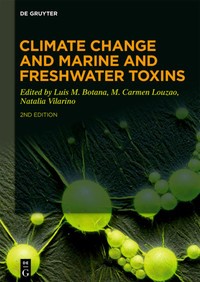A new book compiles the current evidence on climate change and toxin producing harmful algal species in aquatic systems. A book chapter, sponsored in part by NCCOS, describes some of the emerging challenges facing harmful algal bloom (HAB) modelers in a rapidly changing world.

The chapter explores modelling challenges concerning expanding knowledge of the biological complexity of the harmful algae, the community of organisms where they live and compete, their changing environments and the evolving technology used to study them. Sections devoted to climate complexity, nutrient complexity and ecological complexity underscore the need for multifaceted HAB models.
The authors state that at the same time as temperatures rise, carbon dioxide increases and nutrient runoff accelerates, the forms of nutrients are changing in many regions. These factors affect not just the HABs themselves, but also how individual harmful (and non-harmful) species interact in a complex and bewildering array of relationships. Measurement approaches are also rapidly changing not only for the collection of HAB data per se, but of many environmental parameters leading to both a “deluge” of data, and markedly different kinds of data, to analyze and to potentially apply in models (e.g.,“omnics”).
Model complexity has increased because many – if not most – HAB species are now recognized as being mixotrophic. HAB mixotrophic feeding, combining photosynthesis with carnivory, greatly complicates HAB understanding, data collection and modeling.
Climate complexity involves understanding the impact of temperature, carbon dioxide and pH changes on cell physiology and ecology. Models are challenged to capture these changes because our fundamental understanding of cell physiological responses to temperature, carbon dioxide and pH, in combination, needs to be advanced.
Nutrient complexity arises from nutrient loads increasing substantially in the past several decades with the sources supporting these increased loads changing with human demography, human diets and food production.
Ecological complexity is highlighted by showing how bacteria, grazing and sediment biogeochemistry interactions affect cell growth, and toxicity, plankton diversity and community dynamics.
Emerging model types such as machine-learning (artificial neural network) approaches allow the torrent of new genomic data to be incorporated in models of ecosystem function. Although modeling approaches have rapidly advanced, the authors relay the importance to remember that different types of models are used for different purposes.
In summary, the “new normal” in many regions of the world is more nutrient pollution, more extreme events, and changing climatic conditions. More data are becoming available through new approaches and new methodologies, yielding challenges to incorporate these new data streams. New model approaches provide the potential for advancing computational capabilities to put society in a position to better predict – even if we cannot yet control – the more frequent and intense HABs that are anticipated in the future.
This research was supported in part by NCCOS ECOHAB projects Development of a Coupled Hydrodynamic-Biogeochemical Model to Predict Prorocentrum minimum and Karlodinium veneficum Blooms in Chesapeake Bay and Life and Death of Karenia brevis Blooms in the Eastern Gulf of Mexico.
Citation: Glibert, P.M., A.H.W. Beusen, A.F. Bouwman, J.M. Burkholder, K.J. Flynn, C.A. Heil, M. Li, C.-H. Lin, C.J. Madden, A. Mitra, W. Nardin, G. Silsbe, Y. Song and F. Zhang. 2021. Multifaceted climatic change and nutrient effects on harmful algae require multifaceted models, Chapter 12, pp. 473–518. In: Botana, Luis M., M. Carmen Louzao and Natalia Vilarino (Eds), Climate Change and Marine and Freshwater Toxins, 2nd edition. De Gruyter Publishers. doi.org/10.1515/9783110625738-012
